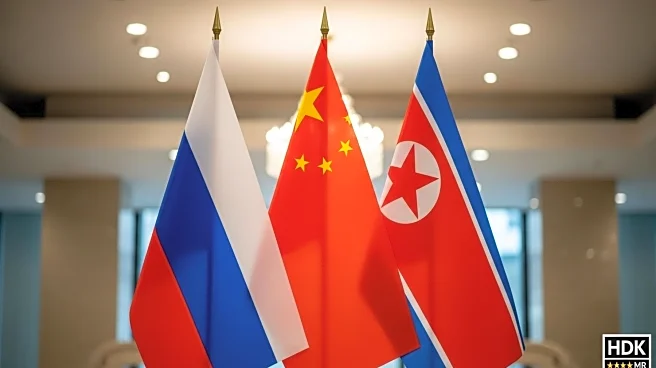What's Happening?
The leaders of Russia, China, and North Korea convened in Beijing this week, showcasing a united front that underscores their growing alliance. This gathering has been interpreted as a direct challenge to the rules-based international order traditionally led by the United States. Stephen Hayes, editor of The Dispatch, noted that these nations are openly declaring their intent to dismantle the post-war international framework established by the U.S. The meeting has sparked discussions about the implications of such alliances on global politics, particularly in light of President Trump's foreign policy approach, which has been characterized by some as alienating allies while accommodating adversaries.
Why It's Important?
The meeting of these three nations' leaders is significant as it highlights a potential shift in global power dynamics. The strengthening of ties between Russia, China, and North Korea could pose challenges to U.S. influence and its ability to maintain the current international order. This development may lead to increased geopolitical tensions and necessitate a reassessment of U.S. foreign policy strategies. The alliance could also impact global economic and security frameworks, as these countries may collaborate on initiatives that counter U.S. interests. The situation underscores the importance of diplomatic engagement and strategic alliances for the U.S. to navigate this evolving landscape.
What's Next?
The U.S. may need to consider diplomatic and strategic responses to this emerging alliance. Potential actions could include strengthening ties with traditional allies, engaging in multilateral diplomacy, and reassessing its approach to international relations. The U.S. Senate and other political bodies might also scrutinize the administration's foreign policy decisions, particularly those perceived as weakening alliances. Additionally, there could be increased focus on defense and security measures to counter any potential threats posed by this alliance.
Beyond the Headlines
This development raises questions about the long-term implications for global governance and the balance of power. The alliance could lead to shifts in international trade, security policies, and diplomatic relations. It also highlights the need for the U.S. to address internal divisions and present a unified front in international affairs. The situation may prompt discussions on the effectiveness of current U.S. foreign policy and the need for adaptation in response to changing global dynamics.










